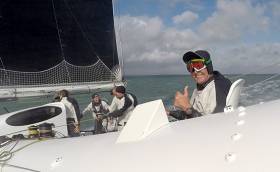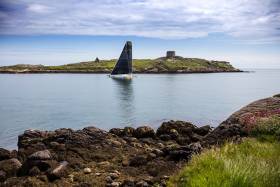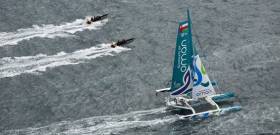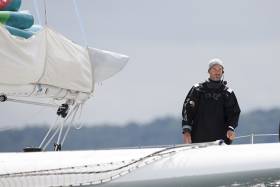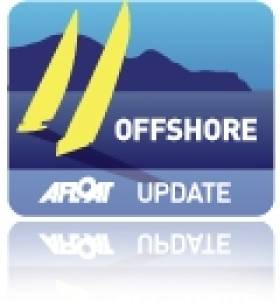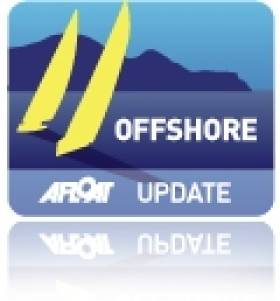Displaying items by tag: MOD 70
The Italian Multi 70 Team Wins the High Speed Duel Against PowerPlay in Cowes to Dinard Match Race
Maserati Multi 70 and Giovanni Soldini won in the duel against Peter Cunningham’s MOD 70 PowerPlay and conquered the Channel Record today. They set sail off Cowes (UK) at 9:13:40 GMT and they crossed the finish line off Dinard (FR) at 13:44:29 GMT, sailing 138 miles in 4 hours, 30 minutes and 49 seconds, with an average speed of 30,59 knots: just under 4 minutes less than the competitor PowerPlay, who finished the race with an elapsed time of 4 hours, 34 minutes and 6 seconds.
The Italian Team’s time is 18 minutes better than the 2015 record set by Lloyd Thornburg and Brian Thompson aboard Phaedo3.
The elapsed times have been collected by the two competing teams, they will have to be ratified by the World Sailing Speed Racing Council.
Aboard the trimaran, Soldini sailed with a six-man crew: Ambrogio Beccaria, Vittorio Bissaro, Guido Broggi, François Robert, Carlos Hernandez Robayna and Matteo Soldini.
Soldini explains: “The first hour was quite slow, we had to gybe five or six times to get out of the Solent. Luckily, once we were in the Channel we took off and we sailed fast as lightning! We crossed the channel very quickly, with an average speed over 35 knots. However, that wasn’t enough to beat PowerPlay, who was also sailing incredibly fast, but what really made the difference was the route: we were extremely careful to the course, especially near the Channel Islands, and that is what made it possible for us to gain those few minutes of advantage. I want to thank not only my incredible Team, but also Peter Cunningham and PowerPlay’s crew, who made the challenge even more exciting!”
The Cowes to Dinard is the second of the three records in the English Channel in Maserati Multi 70’s racing program: on 16th April the Team conquered the Plymouth to La Rochelle record (12 hours, 15 minutes and 21 seconds) and, if the weather allows it, in the next few weeks they will attempt a new challenge, to beat the Fastnet Original Course record (from Cowes to Plymouth, sailing around the Fastnet Lighthouse, south of Ireland), set just a few weeks ago by PowerPlay.
Between challenges, Maserati Multi 70’s Team doesn't stop: in collaboration with the engineers from the Maserati Innovation Lab, Soldini and his crew analyse the data collected at sea to study and develop new systems to optimise the trimaran’s performance. Soldini explains: “During the winter we installed new electronic components and more performing appendages, but we won’t stop here: Maserati Multi 70 is like a laboratory that’s constantly evolving and we’re always curious to discover new innovations.”
MOD 70 PowerPlay Set for World Record Match Race with Maserati
Peter Cunningham’s MOD70 PowerPlay is set for a world record attempt from Cowes – Dinard tomorrow, Thursday 22 April 2021. The current record for the 138 nautical mile course is held by MOD70 Phaedo 3 which scorched across the English Channel at an average speed of 28.66 knots in a record time of just 4 hrs 48 mins 57 secs.
PowerPlay’s record attempt will have the added thrill of direct competition. Giovanni Soldini’s Multi70 Maserati has also announced a record attempt. Two of the world’s fastest ocean-going multihulls will go head-to-head on a racecourse that dates back to 1906.
 Peter Cunningham on the helm of MOD70 PowerPlay Photo: Lloyd images
Peter Cunningham on the helm of MOD70 PowerPlay Photo: Lloyd images
“This is a great occasion for the sport, PowerPlay has the greatest respect for Maserati and we know the feeling is mutual,” commented Peter Cunningham. “Maserati beat PowerPlay across the line in the RORC Transatlantic Race but PowerPlay beat Maserati in the RORC Caribbean 600, so this is going to be a fascinating race.”
 The 138nm Cowes - Dinard World Record attempt course
The 138nm Cowes - Dinard World Record attempt course
The Cowes - Dinard World Record attempt follows PowerPlay's successful world record run for the original Fastnet Course in April 2021 as Afloat reported here
Lloyd Thornburg’s Phaedo 3 Breaks Round Isle of Wight Record
Lloyd Thornburg’s Phaedo 3 set a new World Record time of 2 hours 4 minutes and 14 seconds around the Isle of Wight on Friday afternoon. Now the MOD70 holds both the World Record and Race Record. The boat itself held the old World record of 2 hours 21 minutes and 25 seconds, but that is when is was “Foncia” and being skippered by Michel Desjoyeaux. Record still to be ratified by the WSSRC.
Crew onboard for the race: Brian Thompson, Miles Seddon, Robert Greenhalgh, Peter Greenhalgh, Pete Cumming, Sam Goodchild, Fletcher Kennedy, Justin Slattery. Onboard media; Rachel Fallon-Langdon
Round Ireland Race competitor Phaedo3 came through Dalkey Sound under full sail this morning, touching speeds of 17–knots. The MOD70 skippered by American Lloyd Thornburg was on a training for Saturday's Volvo Round Ireland race start off Wicklow Head. Scroll down for 30–second video clip.
Onboard for Phaedo3's race is Justin Slattery, a Cork offshore sailor who is a double winner of the Volvo Ocean Race. Also onboard the giant trimaran is British sailor Brian Thompson, the first Briton to break the Round the World sailing record twice. He is also the first to sail non stop around the world four times.
The learning curve on the Sultanate of Oman’s flagship MOD70 Musandam-Oman Sail is due for a shift in emphasis in 2016 with their early season programme of the Myth of Malham, the Round Ireland Yacht Race and the Transat Quebec-St Malo races designed to hand Omani crew extra roles and responsibility in the pursuit of success.
Last year, French skipper Sidney Gavignet placed the focus on fitness as they racked up thousands of miles across Europe with a 50% Omani crew, setting a new Round Ireland record plus a new speed record at Kieler Woche 2015.
The stakes have been raised this year and the selection of the three events in May, June and July will help to prepare the Omani sailors for roles at the highest level of offshore racing.
The Myth of Malham at the end of May (28-29) and the Round Ireland Race in June (18) are both organised by the UK’s Royal Ocean Racing Club and offer an opportunity to compete against other MOD70s, explained Gavignet, while the Quebec to St Malo Race is more about adventure and exploration.
“The Quebec to St Malo Race is a classic,” he said. “It is a race I have done three times and it is special. East to west across the Atlantic starting with a 400-mile section down the Saint Lawrence river which is bordered by mountains on both sides. There are lots of whales – including the Beluga Whale – and white beaked and white sided dolphins. In a sailor’s career doing this race is something you will never forget.
“It is more about adventure and the memories. Also it means two transatlantics – one going there and one coming back so it is good training for our Omani crew mates.”
Although Oman Sail and Gavignet have yet to finalise the crew for the season, he is keen to take new offshore talent Raad Al Hadi, who impressed during a recent training run between Lorient and Morocco.
“Raad is good and learning quickly so we will take him from Quebec to St Malo where he will gain experience but he is still a student so we do not plan to take him on the RORC races,” Gavignet said.
Omani sailors Fahad Al Hasni, Sami Al Shukaili, Yassir Al Rahbi will also be back in action along with Irish offshore specialist Damian Foxall and France’s Jean Luc Nelias, who was navigator on Volvo winner Groupama in 2006.
The three Omani sailors have been preparing for their summer by campaigning their J80 at the 2016 Grand Prix Ecole Navale in France having raced together for EFG Sailing Arabia – The Tour in February.
Gavignet’s experience will serve Musandam-Oman Sail well in the Quebec-St Malo but the Myth of Malham, a 230-mile race from Cowes to the famous Eddystone Lighthouse and back, will be a brand new experience for him.
“It is an English classic so we are looking forward to it and would love to win it. We will be up against two other MOD70s which is the main reason why we are doing it but it will be a challenge because the other two boats Phaedo and Team Concise have done a lot of sailing over the last few months.”
Results are important, Gavignet continued but Oman Sail’s objective to develop top class sailors for world class events requires a broader focus.
“We want the guys to take on more responsibility. To be an accomplished offshore sailor, you have to think on your feet and we have some real talent on this crew so I will be working with each crewmember individually to encourage them to take responsibility, perhaps for a winch or for safety or whatever other role they might need to prepare for a major offshore race.”
The remainder of Musandam-Oman Sail’s summer programme will be announced later in the season but according to long standing crew member Fahad Al Hasni, racing against the other MOD70s is the highlight.
“By the end of this programme, we would like to be the leading MOD70,” he said. “It will be a challenge because the boats are all different now and the other crews have done a lot of sailing but our time together as a team on the Farr 30 at EFG Sailing Arabia – The Tour, during our training run from Lorient to Rabat and in the J80 at GP Ecole Navale has made a difference to our team work so we feel well prepared.”
MOD70 Musandam-Oman Sail Programme
Myth of Malham: Starts Cowes, Isle of Wight – Saturday 28 May
Volvo Round Ireland Yacht Race: Starts Wicklow, Ireland – Saturday 18 June
Quebec – St Malo: Starts Quebec, Canada – Saturday 10 July
Kerry yachtsman Damian Foxall shattered a long standing American Yacht Racing record at the weekend when his MOD 70 Orion crossed the finish line of the Newport to Ensenada Race in 5 hours, 17 minutes, 26 seconds, smashing the former record of 6:46:40, set by the late Steve Fossett on the yacht Stars and Stripes in 1998 by more than 1 hour, 29 minutes.
It sets up Ireland's top offshore racer nicely for his next campaign when he rejoins the MOD 70 Omansail for RORC's Myth of Malham race before the Round Ireland race race in eight weeks time, a race previewed by WM Nixon at the weekend. Foxall joins Oman Sail in France next week.
Orion, the MOD70 based in the San Francisco Bay area and owned by Tom Siebel broke the fastest elapsed time record in the International Yacht Race.
Foxall was racing with a top Amercian crew. After finishing the record breaking run, fellow crew member Peter Isler said: 'Another course record for the MOD 70 Orion. This one is going to be hard to beat we had a great team, an amazing boat and beautiful sailing conditions!'
In a race press release organisers said: Orion crossed the finish line with an incredible time of 5:17:26. This demolishes the old record of 6:46:40, set by the late Steve Fossett on the yacht Stars and Stripes in 1998, by more than 1 hour and 29 minutes.
Earlier in the day, Orion crossed the start line ahead of its two classmates. Apparently, it never looked back. Winds at the start were a modest 8 to 9 knots. But all classes caught the steady gusts and were horizon bound by 12:30 p.m.
Mighty Merloe, the 60 ORMA that has been dueling with Orion for first to finish honors the past three years, followed just 20 minutes later with a time of 5:37:18 – also breaking the old record by more than an hour. Orion is also expected to win its class based on a corrected time of 12:26:36. The Orion crew had turned the boat around and was heading North before many of the race organizers were able to arrive from Newport Beach.
A series of accidents and heavy traffic on I5 and at the border crossing meant many of the hardworking race hosts missed seeing the historic finish.
But unlike the year when Dennis Conner set a record, the finish boat was in place to record the record time. “What a historic occasion,” said NOSA Commodore Dave Shockley. “Although there have been much advancement in yacht design and construction since the previous record was set, I’m sure the skill and dedication of the crew had much to do with shattering the old record.” Some of the shore-side sailors estimated the record breaking run meant Orion averaged 25 knots an hour over the 125-mile course. “The stars really aligned this year – fabulous boats and crew members were able to take advantage of great weather conditions,” Shockley said. “In sailboat racing, to beat a record by that much is really prenominal.”
The Round Ireland Speed Record champion, the MOD 70 trimaran Oman sail continues to search for a missing crew member lost overboard.
Mohammed Al Alawi, 26-year-old crew member of MOD70 trimaran Musandam-Oman Sail remains missing this evening following a Man Overboard incident last Wednesday 7 October in the early hours of the morning, pre-dawn, just south of Pula in Croatia while the MOD70 was en route from France to Trieste in Italy for the Barcolana.
Musandam-Oman Sail - flagship of the Sultanate of Oman - successfully completed a Round Ireland speed sailing record attempt last May taking three hours off the 22–year–old record, breaking Steve Fossett's long standing record of 44 hours with Lakota in 1993. Her crew that did not include the missing sailor were based at the National Yacht Club in Dun Laoghaire.
Day four and the extensive search for Mohammed continues and the search area has extended into Italian waters; the search team has been a mix of Oman Sail, private search and rescue companies and the Croatian coastguard, using helicopters, airplanes, and boats including Musandam-Oman Sail. Today's inclement weather of strong easterly winds, limited visibility and rain was not conducive to a detailed search.
Ahmed Al Alawi, father of Mohammed, who is in Croatia with the team said "We [the family] extend our deep gratitude to all who are supporting this search, especially the Omani Government, the staff of Oman Sail, Her Excellency The Sultanate of Oman's Honorary Consul of Croatia and the Croatian Coastguard who have been exemplary. We have been inundated with heart-felt messages of support which are much appreciated." The search continues.
Search updates can be found here
Two Mods To Race TransAtlantic With RORC
#roundirelandspeedrecord – Musandam-Oman Sail - flagship of the Sultanate of Oman - completed the Round Ireland speed sailing record attempt this morning just before 1100 taking three hours off the 22–year–old record, breaking Steve Fossett's long standing record of 44 hours with Lakota in 1993.
The 70–foot Multihull screamed past the Muglins Rocks on the outskirts of Dublin bay at over 30–knots to claim the record in a time of 40 hours, 51 minutes and 57 seconds.
The record officiated by Irish speed sailing commissioner Chris Moore from onboard a DBSC committee vessel has yet to be ratified by the World Speed Sailing Record Council.
On coming ashore at the National Yacht Club the first call by French Skipper Sidney Gavignet was for a doctor to treat a crewmans shoulder due to an injury sustained on the 700–mle journey that started at 6pm on Bank Holiday Monday.
Onboard with Gavignet are Alex Pella from Spain and Jean Baptiste Levaillant together with three Omani sailors and skipper Gavignet. Sadly for this attempt, Ireland's offshore supremo Damian Foxall was not on the crew list.
Strong winds this morning on the Wicklow coast presented ideal conditions for the closing stages of the record attempt for the professional crew who travelled the last 100–km in little over two hours. The scenario was much different to 12 hours earlier when the 70–footer was more–or–less beclamed off the Mayo coast.
The tired and successful crew came ashore at lunch–time and ordered steak and chips at the National Yacht Club to celebrate the fastest ever sailing circumnavigation of Ireland.
"This is a great accomplishment for Oman and Oman Sail," said David Graham, CEO of Oman Sail. "Attempting to break the Round Ireland record has been our goal for many years now and achieving the feat is a shining example of the hard work and dedication of our sailing squad. Racing against yourself to set a time is the hardest test of discipline. The team must remain focused and motivated at all times, and we have instilled these values since the start of the Oman Sail programme. With a 50% Omani crew, this record shows that the present and the future of sailing in Oman is on the right course."
The crew needed to be back by 1500 to take the record but their breakneck speeds down the west coast of Ireland, at one stage reaching 38 knots, meant they were finished well before that, some three hours and 50 minutes faster than the 44 hours and 42 minutes set by Steve Fossett in his first ever world record back in September 1993 aboard his 60ft trimaran Lakota.
Helmsman Fahad Al Hasni said this record attempt coming at the end of a European winter, had proved tough.
"It was both scary and exciting because we saw 40 knots of wind and massive waves that we reckoned were around six metres but the main challenge was the cold," said Al Hasni.
"It is still winter here and my hands were so cold I still can't feel them but I'm really happy because there have been some very famous sailors who have made attempts on this record but we are the ones who now hold it. We have become a really good, tough team and it feels great to be part of it."
It had been a challenging but amazing experience for the Omani sailors, added Gavignet, who was full of praise for his crew.
"This was a real test for them and they came through with flying colours – the whole crew put in a great effort.
"We had to be very careful in these conditions and had no choice but to slow down at times but to have achieved the record so early in our season is a great feeling. It had been a priority and now it is done."
This was Musandam-Oman Sail's second attempt on the Round Ireland record. Two years ago they set off from Dublin Bay with high hopes but were forced to abandon due to unsafe conditions.
Today was a different story and everyone on board was delighted to add this one to their burgeoning collection.
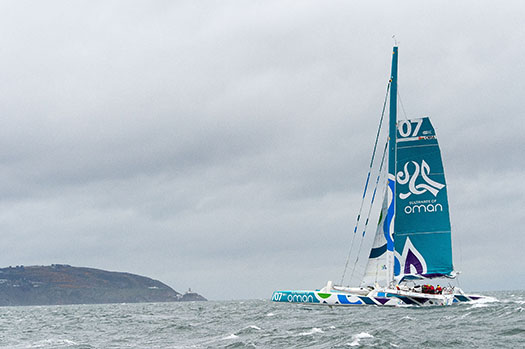
Mission accomplished! The giant Tri completes its 700–mile voyage in record time this morning. Photo: Michael Chester
Read also articles by WM Nixon:
Round Ireland Speed Sailing Record Times and It May Be A New Round Ireland Record But The Three Hour Margin Tells Us What A Great Job Lakota Did 22 Years Ago
Damian Foxall's Transat Jacques Vabre Start Postponed
#offshore – Violent low-pressure systems sweeping in from the West forced the Transat Jacques Vabre race committee to postpone the start of the 11th edition for the second time and to cancel the MOD70 20nm prologue for the Sultanate of Oman's flagship campaign Oman Air-Musandam and their competitor, Edmond de Rothschild.
Originally planned for Sunday, weather conditions delayed the scheduled start to Monday for the IMOCA 60s, Class 40s and Multi 50s, with a prologue planned for the two MOD70s, but late Sunday night the race committee decided to further postpone until Thursday at the earliest for all except the MOD70s that might be able to slip out on Wednesday.
"Starting this race in November is always challenging, we had a low pressure come through last night and there is another one coming through tomorrow and the most important thing for the race committee is to get us off safely," said Damian Foxall from Ireland who has over 350,000 nautical miles behind him, a recent Volvo Ocean Race win with Groupama and is on his third Transat Jacques Vabre.
Oman Air-Musandam skipper, Sidney Gavignet (FRA), who has his fair share of single-handed, double-handed and Volvo Ocean Races under his belt explained the challenges that the race committee faces: "The fleet is made up of very fast boats with the MOD70s; intermediate boats with the Multi 50s and the IMOCA 60s and then the Class 40s which are a bit slower and mixed amateur and professional crews. For this reason it is very difficult to find a window.
"It is easier for us because we go quickly so we need a small window of opportunity to get out of the English Channel and to Finisterre from where we can consider we are in good shape, still very safety conscious, of course, but looking for speed as well. For the Class 40s it takes some time to get out of the Channel and through Biscay, so it is more complicated," he said.
"The MOD70s are very seaworthy boats, they are one design, well built and really reliable. We have been sailing them hard all year in very rough conditions, but of course with the current conditions of very high westerlies blowing against the tide, the sea state is very steep and rough. They are boat-breaking conditions out there right now," added Damian.
For the race organisation sending a fleet of 43 boats out – that is 86 people on the water – is a major decision and a big responsibility. "It is hard. I think they made the right decision to delay, these conditions are boat breaking – in Biscay there is a 4 to 5 metre sea state whipped up by the westerlies that have been blowing for the last three days, but now the challenge is to find the right window to start," said Sidney.
In the meantime, the Oman Air-Musandam duo will continue with their routine of gym, weather checks and boat checks until the race committee calls for a start.
"We are ready to go and looking forward to the warmer weather in the South!" said Sidney as the skies opened once more over Le Havre.
TV Interviews with Damian Foxall (IRL) and Sidney Gavignet (FRA) in French and English on the weather and the postponement will be available from 1800CET


























